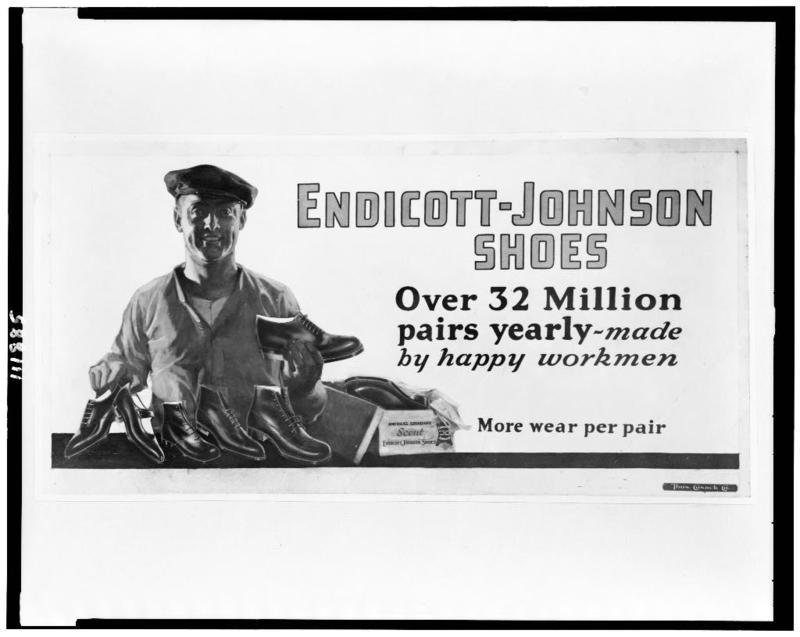George F. Johnson and How He Tried to Create a Happy Workforce
By Peter Favata
Introduction
George F. Johnson was the president of the Endicott Johnson Shoe Company for many years. During his tenure, he pursued for a happy workforce. Whether this was for promotional purposes or for a stable, motivated, more productive workforce, he strived for this goal. Inglis quoted in his book “…the workers are his friends. They’d do wonders for him.” George F. Johnson believed in Welfare Capitalism. This is an ideology that management has an obligation for the well-being of its workers. In addition to employing Welfare Capitalism, he utilized financial and non-financial incentives along with instilling in the workforce a sense of ownership in attempts to facilitate a happy workforce.
Elements utilized by George F. Johnson to inspire a happy workforce
High Wages
- Workers were paid some of the highest wages in the shoe industry.
- Workers had the highest average wages in the shoe industry across five states including New York during 1937.
- The average wage at Endicott Johnson more than tripled from 1900 to 1935.
Other Financial Benefits
- Endicott Johnson built low cost houses for sale to their employees. These houses were sold at very low interest rates and built in communities with other Endicott Johnson workers.
- Provided medical, dental, and surgical services to their employees.
- Employees were giving paid vacation days. An example is they were given two days paid vacation for the 4th of July weekend.
Non-Financial Benefits
- The building and maintaining of parks, pools, golf courses, and markets for the Endicott Johnson workers as well as their families and communities.
- It was made known to the workforce that promotions came from within the company.
Giving Employees a Sense of Ownership
- Endicott Johnson would sometimes post the companies yearly earnings on the walls of the factory to show the employees that their hard work pays off for the success of the company.
- The workers would receive profit sharing bonuses.
- There was an ongoing dialog between George F. Johnson and the workers of Endicott Johnson. For example, he had many letters to the workers as well as having them in the E-J Workers Review. This was a monthly magazine put out by the company.
Conclusion
George F. Johnson used a variety of motivations to try to create a happy workforce. In addition to Welfare Capitalism, he instituted both financial and non-financial benefits as a means to that end. In addition to high wages they also provided low cost housing, medical benefits, community recreational facilities, as well as giving employees a sense of ownership were all ways that George F. Johnson tried to create a happy workforce. George F. Johnson strived to back up the claim in his 1920 billboard “Over 32 Million pairs yearly-made by happy workmen.”
Bibliography
- Partners All. Endicott Johnson Workers. Let’s Look At The Record. January 1, 1936
- EJ Workers Review (November 1920)
- Zahavi, Gerald. Workers, Managers, and Welfare Capitalism The Shoeworkers and Tanners of Endicott Johnson, 18901950. Urbana and Chicago: University of Illinois Press, 1988
- Zahavi, Gerald. Workers, Managers, and Welfare Capitalism The Shoeworkers and Tanners of Endicott Johnson, 18901950. Urbana and Chicago: University of Illinois Press, 1988
- Photograph of billboard advertising Endicott-Johnson shoes, showing man displaying shoes / Thos. Cosack Co. , ca. 1923. Photograph. Retrieved from the Library of Congress, https://www.loc.gov/item/94512291/. (Accessed April 07, 2018.)
- Inglis, William. George F. Johnson And His Industrial Democracy. New York: Huntington Press, 1935, page 29
- Photo of George F. Johnson December 1, 2010 https://www.npr.org/2010/12/01/131725100/the-legacy-of-george-f-johnson-and-the-square-deal


